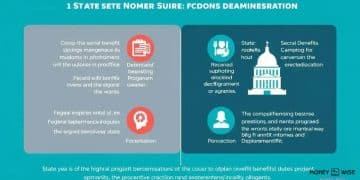Impact of economic downturn on benefits eligibility

The impact of economic downturn on benefits eligibility can lead to changes in government assistance programs, affecting access to unemployment benefits, food assistance, and housing support based on individual circumstances.
Impact of economic downturn on benefits eligibility is a crucial issue that affects many individuals and families. Have you ever wondered how a recession might change the support you can access?
Understanding benefits eligibility during economic downturns
Understanding benefits eligibility during economic downturns is essential for individuals and families facing tough financial times. When the economy struggles, many people find themselves unsure of what support they can obtain. This uncertainty can lead to increased stress and confusion.
Factors Affecting Benefits Eligibility
Various factors determine eligibility for benefits during economic downturns. These include:
- Income level
- Employment status
- Household size
- Type of benefits being applied for
As you can see, changes in your circumstances can impact your access to assistance. For example, if you lose your job, your eligibility for unemployment benefits may shift. Additionally, each program may have distinct criteria that must be met.
Navigating Complex Systems
It can be challenging to navigate the complex systems in place for various benefits. Many individuals may not know how to apply appropriately or what documentation is necessary. Understanding your rights is crucial in these situations.
Many local organizations provide support to help you understand the application process. They can help you gather necessary paperwork and guide you through the application steps. Reaching out to these resources may increase your chances of successfully obtaining the benefits you need.
Don’t hesitate to ask for help. Often, friends, family members, or social workers can offer valuable insights into your specific situation.
Being informed about your eligibility is critical. Regular updates from government websites can provide new information on the benefits landscape, especially during economic hardships. Stay proactive about your needs, and research what programs are available to you.
Types of benefits affected by economic changes

During economic downturns, several types of benefits may be affected. Understanding these can help individuals prepare and access the support they need. When the economy falters, government programs often adjust their criteria based on funding and demand.
Unemployment Benefits
Unemployment benefits are commonly impacted during economic changes. More people seeking these benefits can lead to stricter eligibility criteria. In some cases, the duration and amount of benefits may also be altered. Knowing your rights and the specific requirements during a downturn is essential.
- Eligibility may depend on recent earnings.
- Duration of benefits can vary based on economic conditions.
- Some states may offer additional support during high unemployment periods.
Aside from unemployment benefits, other programs like food assistance and housing support are also vital for families experiencing hardships. These programs work to combat food insecurity and provide stability during difficult times.
Food Assistance Programs
Food assistance programs, such as the Supplemental Nutrition Assistance Program (SNAP), can see changes in eligibility. In response to an economic downturn, more families may qualify due to falling incomes.
It’s crucial to stay informed about your eligibility as the requirements can shift. For instance, if your personal income decreases, you might qualify for benefits that were previously out of reach. Don’t hesitate to reach out to local agencies to understand what help you can access.
Housing Assistance
Housing assistance is another critical area affected by economic changes. Programs may expand to help families facing eviction or mortgage issues. Potential changes might include:
- Increased funding for rental assistance.
- Changes in application processes to simplify access.
- New initiatives for temporary housing support.
Overall, being proactive about understanding these types of benefits can greatly improve your chances of obtaining the assistance you need during challenging financial times.
How to navigate benefits applications effectively
Navigating benefits applications effectively can be a challenging process, especially during economic downturns. Understanding how to approach these applications can make a significant difference in whether you receive the help you need. Keeping essential documents organized is crucial to streamline your application process.
Gather Your Documents
First, gather all necessary documents before starting the application. This may include:
- Proof of income, such as pay stubs or tax returns.
- Identification, including a driver’s license or social security card.
- Housing documentation, if you’re applying for housing assistance.
- Any previous correspondence about benefits.
Having these documents ready can save you time and reduce stress as you fill out your applications. Make sure to double-check that everything is current and accessible.
Understand the Requirements
Each benefits program has different requirements. Take time to read the guidelines carefully. Understanding what is expected can help you avoid common mistakes. For instance, many applications require specific information that must be filled out accurately.
Also, keep in mind that deadlines can vary based on the program and your location. Missing a deadline can result in your application being denied or delayed. Stay informed and set reminders for due dates to ensure your application is submitted on time.
Seek Assistance When Needed
If you find the process overwhelming, do not hesitate to seek help. Many organizations, such as non-profits and local agencies, offer support for individuals navigating these applications. They can guide you through the process, review your application, and help you understand your eligibility.
Don’t feel alone in this journey. Engaging with community resources can provide not only knowledge but also emotional support during challenging times. Remember, staying proactive is key to successfully navigating benefits applications.
Case studies on benefits eligibility
Case studies on benefits eligibility can provide valuable insights into how individuals and families navigate assistance programs during economic downturns. By examining real-life examples, we can learn how different circumstances affect eligibility and access to vital support.
Case Study 1: Job Loss and Unemployment Benefits
Consider a family where one parent suddenly loses their job. This change can greatly affect their eligibility for benefits. After losing work, they discovered that they qualified for unemployment benefits due to their previous income level. Maintaining a budget during this time was essential as they adjusted to reduced income.
During this period, they contacted local agencies for help. They learned that they could receive additional food assistance due to their loss of income. This case highlights the importance of understanding how job loss directly impacts eligibility for multiple programs.
Case Study 2: Housing Insecurity
In another case, a single parent faced housing instability after a divorce. With only one income to support their family, they sought housing assistance. They applied for a program designed to help families in crisis.
After providing necessary documentation and proving their situation, they successfully qualified for temporary housing assistance. This enabled them to find stable living conditions while seeking a job that would support their family.
Key Takeaways
These case studies underscore the importance of taking action based on individual circumstances. Here are some key takeaways:
- Understanding eligibility criteria can open up access to multiple benefits.
- Keeping documentation organized is vital for smooth applications.
- Seeking assistance early can lead to better outcomes.
By studying these examples, it becomes clear that every situation is unique, but there are various resources available for families facing economic hardship. Whether dealing with job loss or housing insecurity, being informed and proactive can lead to successfully navigating benefits eligibility.
Resources for assistance during economic hardship
Accessing resources for assistance during economic hardship is essential for individuals and families struggling to make ends meet. Knowing where to find help can make a significant difference in navigating these tough times. Various organizations and programs exist to provide support to those in need.
Government Programs
Many government programs are designed to assist individuals facing economic challenges. Some key programs include:
- Temporary Assistance for Needy Families (TANF): Provides financial support and work opportunities.
- Supplemental Nutrition Assistance Program (SNAP): Helps purchase food for low-income individuals and families.
- Housing Choice Voucher Program: Assists with rental costs for eligible low-income households.
Each program has specific eligibility criteria that applicants must meet. Therefore, it is crucial to review the requirements before applying.
Non-Profit Organizations
In addition to government resources, non-profit organizations play a vital role in providing assistance. These organizations often focus on specific areas such as food insecurity, homelessness, or job training. Many communities have local non-profits that can offer:
- Food banks and meal programs to help with nutrition.
- Financial counseling to manage debt and budgeting.
- Job training services to help individuals find employment.
Connecting with these organizations can provide immediate support and connect individuals to further resources.
Online Resources
The internet is a valuable tool for finding assistance during economic hardship. Several websites compile resources based on state and locality. Some helpful sites include:
- Benefits.gov: Provides information on government benefits and how to apply.
- 211.org: A helpline to connect with local services.
- Feeding America: Helps find food assistance programs near you.
By utilizing these online resources, individuals can easily access information and find the support they need.
In times of economic hardship, understanding the landscape of benefits eligibility is crucial. By exploring the various types of assistance available, including government programs and non-profit support, individuals can better navigate their options. Case studies offer real-life examples of how families have successfully accessed needed resources. Remember that early action and organization are key to securing support during tough times. With the right knowledge and resources, you can empower yourself and find the assistance you need.
FAQ – Frequently Asked Questions about Benefits Eligibility
What types of benefits can I apply for during an economic downturn?
You may apply for unemployment benefits, food assistance programs, and housing support, among others.
How can I find local resources for assistance?
You can search for local non-profit organizations, food banks, or government programs through websites like 211.org or Benefits.gov.
What documents do I need to gather for my benefits application?
You typically need proof of income, identification, and any relevant housing documentation to apply for benefits.
How does my eligibility change during economic hardship?
Eligibility for benefits can change based on your income level, employment status, and household size during economic difficulties.
Why is it important to seek assistance early?
Seeking help early can provide you access to necessary resources before situations worsen, offering better outcomes.





